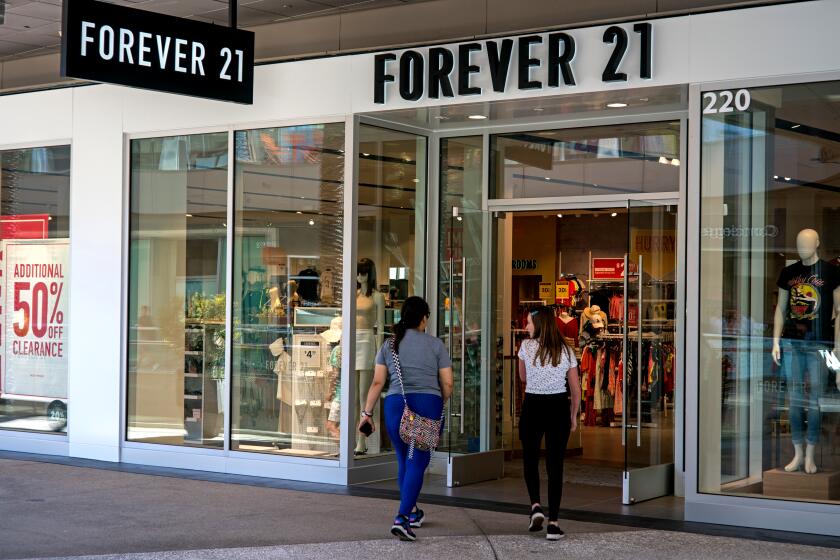Ferrante Headed Fireworks Firm, Ex-CEO Testifies : Courts: He controlled Pyrotronics at same time his Irvine thrift was loaning it millions, court told in fraud case.
- Share via
LOS ANGELES — Robert A. Ferrante was “the boss of Pyrotronics” at the same time that he owned a tiny savings and loan that was making $5 million in loans to the Anaheim fireworks company, a former chief executive of Pyrotronics Inc. testified on Thursday.
Donald P. Crivellone said that Ferrante installed him as the top operating officer at Pyrotronics in March, 1985, and made other crucial management decisions even though documents show that Ferrante neither owned nor had any other control of the company.
He testified that he even talked to Ferrante, not the official owner of Pyrotronics, to ask for a raise in his $50,000-a-year salary. “If he wasn’t going to approve it, the (Pyrotronics) board wasn’t going to approve it,” said Crivellone, who now lives in Atlanta.
His testimony was important to federal prosecutors who are trying to show that the official documents at Ferrante-owned Consolidated Savings Bank in Irvine did not reflect the true nature of its loans to Pyrotronics and that the loans constituted a misapplication of thrift funds.
The deal is one of two that provide the basis for a 17-count indictment charging Ferrante and five others with fraud and conspiracy stemming from the operation of Consolidated, which failed in May, 1986. Its failure is expected to cost taxpayers about $30 million.
Others charged are Ottavio A. Angotti, Consolidated’s chairman; Raymond L. Arthun and Peter Sardagna, close Ferrante business associates; Ronald L. Bartholomew, a Consolidated lawyer; and Sigmund Kohnen, president of CB Financial Corp. in Oklahoma. Only Ferrante, Angotti and Arthun are accused in the Pyrotronics deal. All defendants except Arthun are accused of funneling money through CB Financial to benefit a Ferrante real estate project in Texas.
Ferrante’s lawyers assert that both deals were straightforward, legal and documented and that there was no intent to defraud anyone.
They said Ferrante did not own or control Pyrotronics, but as sole shareholder of the bank, he had a paramount interest in making sure the loans were repaid. He shared that interest, they contend, with International Fireworks Co. of America, the company set up to acquire control of Pyrotronics and provide it with needed financing.
But International Fireworks was a “paper corporation,” testified James F. McBride, who was a Pyrotronics vice president in 1985. Crivellone said Ferrante was the boss--”the boss of Pyrotronics, my boss.”
The case seems a bit like ancient history. Prosecutors acknowledge that it is one of the oldest bank fraud cases to go to trial, and that fact was punctuated by Thursday’s testimony of W. Patrick Moriarty, whose civil and criminal problems in 1984 forced him out as Pyrotronics’ chairman.
Moriarty served 29 months in prison on mail fraud charges while other charges of public corruption and bribery were dismissed or thrown out on appeal. The widely publicized criminal investigation of him and a host of civil lawsuits against him and Pyrotronics alleging that he misused loan proceeds caused Bank of America in 1984 to stop financing Pyrotronics.
Despite his efforts at the time, Moriarty could not find any lender that did not require, at least, that he resign from the company before it would provide the needed line of credit.
For 26 years, Pyrotronics had borrowed money throughout the year to pay overhead, production and purchasing costs. After the July 4 holiday season each year, it paid off its bank loans with interest. But even without Moriarty, the company had a tough time finding money, testimony showed.
Ferrante at first wanted to buy Pyrotronics, Crivellone said, but he couldn’t find financing himself. So he used Consolidated, Crivellone said, to make loans, set up International Fireworks to control the fireworks company and controlled the corporation through a voting trust, which gave the voting rights to International Fireworks and let the shareholders continue to receive dividends and other economic benefits of their ownership stakes.
Pyrotronics eventually filed for bankruptcy protection in June, 1986. Moriarty said he regained effective control over the company in 1988, after he was released from prison, in a $200,000 purchase from International Fireworks. He now uses the company to act as a gas and oil broker between China and Kuwait.
The trial is expected to continue for a month, lawyers said.
More to Read
Inside the business of entertainment
The Wide Shot brings you news, analysis and insights on everything from streaming wars to production — and what it all means for the future.
You may occasionally receive promotional content from the Los Angeles Times.








